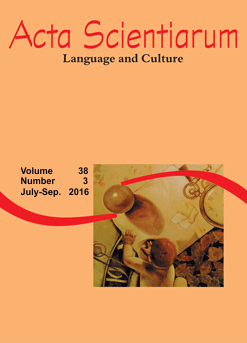<b>O Precipício de Chichisbéu: o ‘gracioso’ feito à sombra do ‘galán’ em <i>O precipício de Faetonte</i>, de Antônio José da Silva
Resumo
Neste trabalho, analisamos a personagem de Chichisbéu na peça O Precipício de Faetonte, de Antônio José da Silva (1705-1739), representada em 1738 no Teatro do Bairro Alto, Lisboa, Portugal. Partindo de perspectivas teóricas diversas, mas convergentes no sentido de compreender a pouco explorada dramaturgia do período, tentamos um entendimento dos textos joco-sérios do comediógrafo. Como forma tragicômica de origem espanhola, a personagem do gracioso é o principal representante do cômico nesse gênero teatral. Busca-se, portanto, o entendimento desse personagem (Chichisbéu, no caso) em suas relações com o ‘galán’ e a relação da obra do dramaturgo com as preceptivas e técnicas de escrita teatral vigentes no período.
Downloads
DECLARAÇÃO DE ORIGINALIDADE E DIREITOS AUTORAIS
Declaro que o presente artigo é original, não tendo sido submetido à publicação em qualquer outro periódico nacional ou internacional, quer seja em parte ou em sua totalidade.
Os direitos autorais pertencem exclusivamente aos autores. Os direitos de licenciamento utilizados pelo periódico é a licença Creative Commons Attribution 4.0 (CC BY 4.0): são permitidos o acompartilhamento (cópia e distribuição do material em qualqer meio ou formato) e adaptação (remix, transformação e criação de material a partir do conteúdo assim licenciado para quaisquer fins, inclusive comerciais.
Recomenda-se a leitura desse link para maiores informações sobre o tema: fornecimento de créditos e referências de forma correta, entre outros detalhes cruciais para uso adequado do material licenciado.




















6.png)









